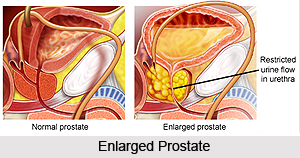 There exists two warning symptoms to indicate the possibility of prostate disorders. The first is the irksome interference with the passage of urine, facing difficulty while releasing the urine and the third being the need to evacuate that urine frequently during the night`s sleep. Other symptoms for recurrent prostate disorders include a dull aching pain in the lower back and pain in the hips, legs and feet; facing difficulty to start the stream of urine; and, a recurrent tendency to dribble after urinating. However, the above symptoms of swelling of the prostate are in all likelihood benign (i.e., exhibiting signs of being non-cancerous). There also exist two warning signals to indicate the likelihood of prostate disorders. The first is the interference with the passage of urine, and the second is the need to void the urine frequently during the night`s sleep. Other symptoms are a dull aching pain in the lower back and pain in the hips, legs, also including the feet. The position of the prostate gland makes it much predisposed and vulnerable to congestion and other disorders. While in an erect position, the bodily pressure falls on the pelvic region, just where the prostate gland is situated. In the process natural aging, the body tends to grow heavier and as such, loses its suppleness and litheness. This exerts greater pressure on the pelvis and increases the vulnerability of the prostate gland.
There exists two warning symptoms to indicate the possibility of prostate disorders. The first is the irksome interference with the passage of urine, facing difficulty while releasing the urine and the third being the need to evacuate that urine frequently during the night`s sleep. Other symptoms for recurrent prostate disorders include a dull aching pain in the lower back and pain in the hips, legs and feet; facing difficulty to start the stream of urine; and, a recurrent tendency to dribble after urinating. However, the above symptoms of swelling of the prostate are in all likelihood benign (i.e., exhibiting signs of being non-cancerous). There also exist two warning signals to indicate the likelihood of prostate disorders. The first is the interference with the passage of urine, and the second is the need to void the urine frequently during the night`s sleep. Other symptoms are a dull aching pain in the lower back and pain in the hips, legs, also including the feet. The position of the prostate gland makes it much predisposed and vulnerable to congestion and other disorders. While in an erect position, the bodily pressure falls on the pelvic region, just where the prostate gland is situated. In the process natural aging, the body tends to grow heavier and as such, loses its suppleness and litheness. This exerts greater pressure on the pelvis and increases the vulnerability of the prostate gland.
However, frequent urination is that most crucial symptom of prostate disorder that irks and worries a doctor so much regarding his /her patient. And the other symptoms in prostate disorders are in most of the cases follow up in a serialised manner. Symptoms of the three most fatal types of prostate disorders (Hypertrophy or Enlarged Prostate, Prostate Cancer and Prostatitis) are very often quite alike and a urologist can determine which disorder is causing what symptom.
It is always advised to consult the doctor if an individual any one of the following stated symptoms:
| Difficulty or pain while urinating | Impotence |
| Burning sensation while urinating | A feeling that the bladder never absolutely empties itself |
| Pelvic pain | A sudden inability to urinate |
| Frequent urination | Urinary tract infection |
| Abdominal pain | Hematuria and/or Anaemia |
| "Dribbling" or Incontinence | Nocturia |




